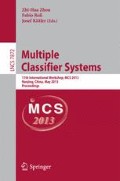Abstract
In this paper, we propose a directed inference approach for multi-class multi-model fusion. Different from traditional approaches that learn a model in training stage and apply the model to new data points in testing stage, directed inference approach constructs (one) general direction of inference in training stage, and constructs an individual (ad-hoc) rule for each given test point in testing stage. In the present work, we propose a framework for applying the directed inference approach to multiple model fusion problems that consists of three components: (i) learning of individual models on the training samples, (ii) nearest neighbour search for constructing individual rules of bias correction, and (iii) learning of an optimal combination weights of individual models for model fusion. For inference on a test sample, the prediction scores of individual models are first corrected with bias estimated from the nearest training data points, and then the corrected scores are combined using the learned optimal weights. We conduct extensive experiments and demonstrate the effectiveness of the proposed approach towards multi-class multiple model fusion.
Access this chapter
Tax calculation will be finalised at checkout
Purchases are for personal use only
Preview
Unable to display preview. Download preview PDF.
References
Bar-Hillel, A., Hertz, T., Shental, N., Weinshall, D.: Learning distance functions using equivalence relations. In: Proc. of ICML, pp. 11–18 (2003)
Bonissone, P.P.: Lazy meta-learning: creating customized model ensembles on demand. In: Liu, J., Alippi, C., Bouchon-Meunier, B., Greenwood, G.W., Abbass, H.A. (eds.) WCCI 2012. LNCS, vol. 7311, pp. 1–23. Springer, Heidelberg (2012)
Bonissone, P.P., Varma, A., Aggour, K.S., Xue, F.: Design of local fuzzy models using evolutionary algorithms. Comput. Stat. Data Anal. 51(1), 398–416 (2006)
Bonissone, P.P., Xue, F., Subbu, R.: Fast meta-models for local fusion of multiple predictive models. Appl. Soft Comput. 11(2), 1529–1539 (2011)
Breiman, L., Friedman, J., Olshen, R., Stone, C.: Classification and Regression Trees. Wadsworth and Brooks, Monterey (1984)
Breiman, L.: Bagging predictors. Machine Learning 24(2), 123–140 (1996)
Chang, C.-C., Lin, C.-J.: LIBSVM: A library for support vector machines. ACM Transactions on Intelligent Systems and Technology 2, 27:1–27:27 (2011)
Cortes, C., Vapnik, V.: Support-vector networks. Machine Learning, 273–297 (1995)
Duchi, J., Shalev-Shwartz, S., Singer, Y., Chandra, T.: Efficient projections onto the l1-ball for learning in high dimensions. In: Proc. of ICML, pp. 272–279 (2008)
Grove, A.J., Schuurmans, D.: Boosting in the limit: Maximizing the margin of learned ensembles (1998)
Ho, T.K.: Random decision forest. In: Proc. of the 3rd International Conference on Document Analysis and Recognition, pp. 278–282. IEEE (1995)
Ho, T.K., Hull, J.J., Srihari, S.N.: Decision combination in multiple classifier systems. IEEE TPAMI 16(1), 66–75 (1994)
Hopfield, J.J.: Neural networks and physical systems with emergent collective computational abilities. Pro. of the National Academy of Sciences 79(8), 2554–2558 (1982)
Lam, L., Suen, S.Y.: Application of majority voting to pattern recognition: an analysis of its behavior and performance. Trans. Sys. Man Cyber. Part A 27(5), 553–568 (1997)
Mayers, J.H., Forgy, E.W.: The development of numerical credit evaluation systems. Journal of the American Statistical Association, 799–806 (1963)
Schapire, R.: The boosting approach to machine learning: An overview (2003)
Shental, N., Hertz, T., Weinshall, D., Pavel, M.: Adjustment learning and relevant component analysis. In: Heyden, A., Sparr, G., Nielsen, M., Johansen, P. (eds.) ECCV 2002, Part IV. LNCS, vol. 2353, pp. 776–790. Springer, Heidelberg (2002)
Vapnik, V.: Problems of empirical inference in machine learning and philosophy of science. Invited Talk at Tenth International Conference on Rough Sets, Fuzzy Sets, Data Mining and Granular Computing, Regina, Saskatchewan (2005)
Vapnik, V.: Estimation of Dependences Based on Empirical Data: Springer Series in Statistics. Springer-Verlag New York, Inc., Secaucus (1982)
Verikas, A., Lipnickas, A., Malmqvist, K., Bacauskiene, M., Gelzinis, A.: Soft combination of neural classifiers: A comparative study. Pattern Recognition Letters 20(4), 429–444 (1999)
Wolpert, D.H.: Stacked generalization. Neural Networks 5, 241–259 (1992)
Woods, K., Philip Kegelmeyer Jr., W., Bowyer, K.: Combination of multiple classifiers using local accuracy estimates. IEEE TPAMI 19(4), 405–410 (1997)
Wu, L., Hoi, S.C.H., Jin, R., Zhu, J., Yu, N.: Learning bregman distance functions for semi-supervised clustering. IEEE TKDE 24(3), 478–491 (2012)
Xing, E.P., Ng, A.Y., Jordan, M.I., Russell, S.: Distance metric learning, with application to clustering with side-information. In: Proc. of NIPS, pp. 505–512. MIT Press (2002)
Xu, L., Krzyzak, A., Suen, C.Y.: Methods of combining multiple classifiers and their applications to handwriting recognition. IEEE Transactions on Systems, Man, and Cybernetics 22(3), 418–435 (1992)
Xue, F., Subbu, R., Bonissone, P.P.: Locally weighted fusion of multiple predictive models. In: Proc. of IJCNN, pp. 2137–2143. IEEE (2006)
Yan, W., Xue, F.: Jet engine gas path fault diagnosis using dynamic fusion of multiple classifiers. In: Proc. of IJCNN, pp. 1585–1591. IEEE (2008)
Yang, T., Jin, R., Jain, A.K.: Learning from noisy side information by generalized maximum entropy model. In: Proc. of ICML (2010)
Yang, T., Mahdavi, M., Jin, R., Zhu, S.: An efficient primal-dual prox method for non-smooth optimization, arxiv (2012)
Author information
Authors and Affiliations
Editor information
Editors and Affiliations
Rights and permissions
Copyright information
© 2013 Springer-Verlag Berlin Heidelberg
About this paper
Cite this paper
Yang, T., Wu, L., Bonissone, P.P. (2013). A Directed Inference Approach towards Multi-class Multi-model Fusion. In: Zhou, ZH., Roli, F., Kittler, J. (eds) Multiple Classifier Systems. MCS 2013. Lecture Notes in Computer Science, vol 7872. Springer, Berlin, Heidelberg. https://doi.org/10.1007/978-3-642-38067-9_31
Download citation
DOI: https://doi.org/10.1007/978-3-642-38067-9_31
Publisher Name: Springer, Berlin, Heidelberg
Print ISBN: 978-3-642-38066-2
Online ISBN: 978-3-642-38067-9
eBook Packages: Computer ScienceComputer Science (R0)

